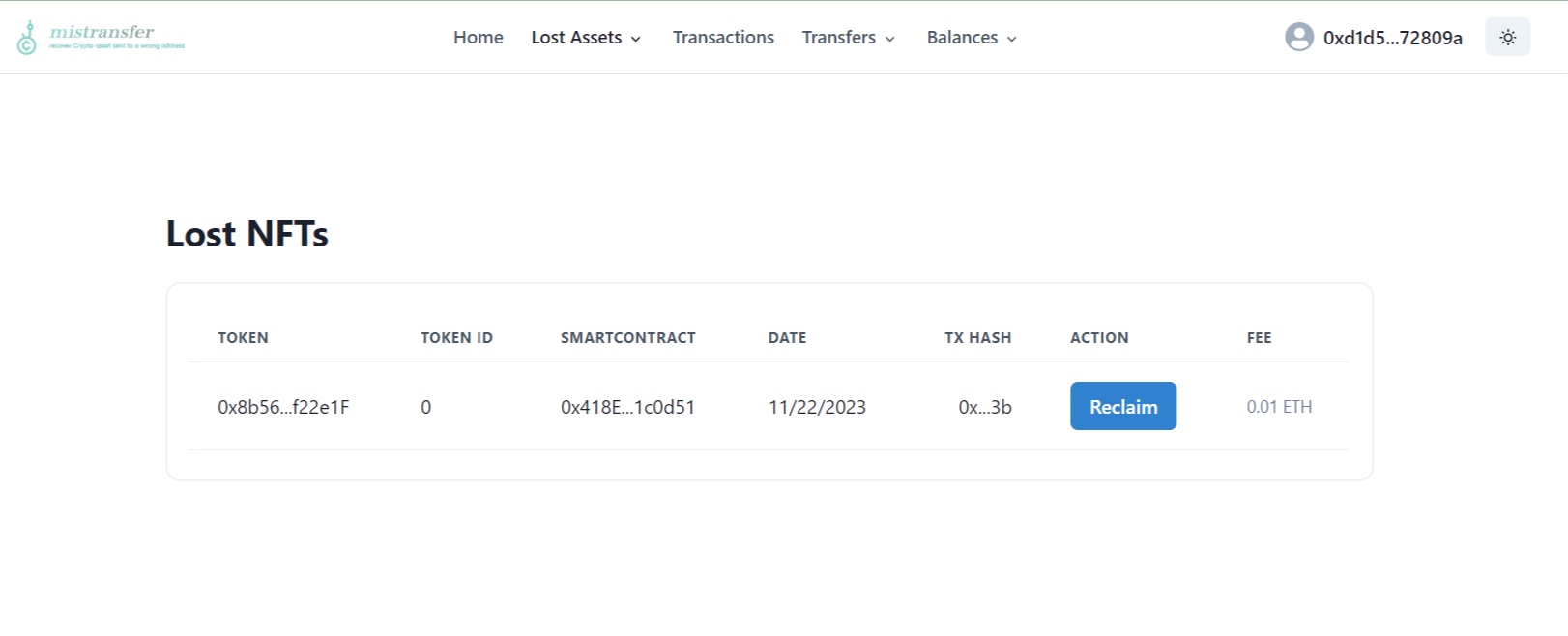mistransfer v0.0.2
Mistransfer
This is a project submitted to the Chainlink Constellation 2023 Hackathon.
Did you send NFT or Token to the wrong smartcontract?
Mistransfer is a decentralized, automated solution to recover lost assets. Visit the demo website on Vercel to see how it works for the users.
The only thing required from the developers is to extend the smartcontract with UserCaring.sol smartcontract.
import { UserCaring } from "@turkmenson/mistransfer/contracts/UserCaring.sol";
contract Sample is UserCaring {
constructor(address _userInterface) UserCaring(_userInterface) {}
}Then, ask users to go to the Mistransfer website.
How it works?
All other options require a centralized responsibility from the decentralized project owner.
A developer needs to check the transaction on the explorer. Then call the function on their smartcontract. It's a hassle as it adds a high responsibility for the user's mistakes.
Mistransfer solves the developer's hassle. We host a website for the users. The transaction to get the lost tokens is executed by the users. All the fees are paid by the users. Not only for a transaction fee, but also to the smartcontract owner too. No actions required from smartcontract owners.
Here is the screenshot of Mistransfer website where user's can reclaim back the mis-transferred NFTs.

Is it secure?
Does any user can call withdraw function? Nope!
When a user clicks to Reclaim button by adding transaction id. The smartcontract verifies transaction itself. Then unlocks the tokens if it's valid.
The smartcontract checks transactions using Chainlink Functions. The Chainlink Functions are a decentralized oracles that execute the Javascript code from the smartcontract.
The javascript code to verify the code is hardcoded into the smartcontract:
Code structure
The project consists of four parts.
The primary component is the smartcontracts which is this repository.
The javascript codes for the oracles are
in the scripts/ directory in .txt format.
The third part is the website repository.
The website is loaded as a submodule in the website directory.
The fourth parameter is optional. It converts the POST method to GET. Chainlink Functions sometimes doesn't execute POST requests.
The POST-2-GET converter is stored in app directory. The live version hosted at https://eth-get-api-b395abe5e4a3.herokuapp.com
Smartcontracts
The project has two smartcontracts.
UserInterface
The UserInterface is the smartcontract
that receives the transaction id.
It's then verifies it using Chainlink Functions.
Then unlocks the tokens.
UserCaring
UserCaring adds a token/NFT withdrawing functionality with a permission to
UserInterface.
The UserCaring is intended to be used by the project owners.
Thus available as the NPM Package.
import { UserCaring } from "@turkmenson/mistransfer/contracts/UserCaring.sol";
contract Sample is UserCaring {
constructor(address _userInterface) UserCaring(_userInterface) {}
}Preventing Load
Some dapps require the user assets. For example, games, bridges, or staking contracts may lock the asset.
To prevent recovering them, the UserCaring provides the modifiers.
Put them in the functions that lock/burn:
contract UserCaring {
constructor(address userinterface) UserCaring(userinterface) {}
modifier intentionalNftAdd(address nft, address user, uint tokenId) {};
modifier intentionalNftRemove(address nft, address user, uint tokenId);
modifier intentionalTokenAdd(address token, address user, uint tokenId) {};
modifier intentionalTokenRemove(address token, address user, uint tokenId);
}Usage
Download the user interface as a submodule.
Create .env from .env.example.
Compile the smartcontracts:
npx hardhat compileOnce compiled, deploy it.
npx hardhat run scripts/deploy.ts --network sepoliaThen export the abi.
npx hardhat export-abi2 years ago